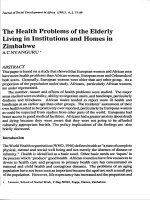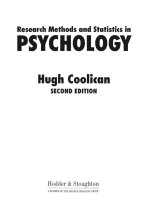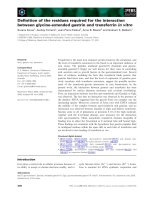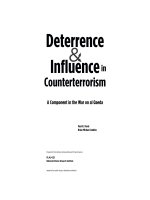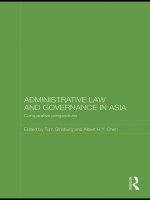FANATICS! Power, identity and fandom in football ppt
Bạn đang xem bản rút gọn của tài liệu. Xem và tải ngay bản đầy đủ của tài liệu tại đây (2.86 MB, 310 trang )
FANATICS!
Football has never been more popular, and the rapidly-changing cultures of
its supporters take an ever greater variety of forms, from the populist ‘New
Lad’ culture reflected in ‘Three Lions’ and ‘Fantasy Football’, to the
carnivalesque celebrations of Scotland’s ‘Tartan Army’ and the highly
politicised Italian ultràs. Embracing fandom across Europe, Fanatics! tackles
questions of power, and of national, regional and racial identities in football.
Despite football’s popularity, the contributors question whether football
remains ‘the people’s game’, or if it is now run entirely by and for the ‘Grey
Suits’—club owners and directors who have overseen the flotation of clubs
on the stock exchange and who have prioritised commercialism over
participation. They ask what space is left for the fans as they struggle to
democratise football and they also consider the role of FIFA and UEFA in
the struggle for control of the world game.
Fanatics! traces the cultures of racism and extreme nationalism in football,
from the English media’s xenophobic coverage of Euro 96, to the demonisation
of Eric Cantona and anti-Asian racism in Scotland. Contributions move from
the ‘Fast Painters’ of the Danish game, to the volatile curva in Italy, to the
Irish football diaspora who travel the globe following the green shirts of Eire.
They go on to discuss media representations of national identity in sports
coverage, and also consider the interplay of national, religious and club
identities among fans in England, Scotland, Ireland, Portugal, Italy and
Scandinavia. Finally, the contributors examine the increasing role of the law
in regulating football, and particularly its fans, and consider the future for
supporters at a time when ‘watching the match’ is more likely to mean turning
on the television than going to a football ground.
Adam Brown is a Research Fellow at the Manchester Institute for Popular
Culture at Manchester Metropolitan University. He has researched and
written extensively on the cultural industries, especially football and music.
He is a National Committee member of the Football Supporters’ Association
and a member of the British Government’s Football Task Force as well as
being a lifelong Manchester United fan, supporting them home and away.
FANATICS!
Power, identity and fandom in football
Edited by Adam Brown
London and New York
First published 1998
by Routledge
11 New Fetter Lane, London EC4P 4EE
This edition published in the Taylor & Francis e-Library, 2002.
Simultaneously published in the USA and Canada
by Routledge
29 West 35th Street, New York, NY 10001
© 1998 selection and editorial matter, Adam Brown; individual chapters, the
contributors
All rights reserved. No part of this book may be reprinted or
reproduced or utilised in any form or by any electronic,
mechanical, or other means, now known or hereafter
invented, including photocopying and recording, or in any
information storage or retrieval system, without permission in
writing from the publishers.
British Library Cataloguing in Publication Data
A catalogue record for this book is available from the British Library
Library of Congress Cataloguing in Publication Data
Fanatics: power, identity, and fandom in football/[edited by] Adam Brown.
p. cm.
Includes bibliographical references and index.
1. Soccer fans—Europe. 2. Soccer—Social aspects—Europe.
I. Brown, Adam, 1967–
GV943.9.F35F36 1998
303.6'2–dc21 98–14911
CIP
ISBN 0-203-02893-7 Master e-book ISBN
ISBN 0-203-18929-9 (Adobe eReader Format)
ISBN 0-415-18103-8 (hbk)
ISBN 0-415-18104-6 (pbk)
Disclaimer: For copyright reasons, some images in the original version
of this book are not available for inclusion in the eBook.
For Mum and Dad,
Jane and Richard Brown,
and for football fans everywhere
vii
CONTENTS
List of illustrations xi
Notes on contributors xiii
Preface xvii
Acknowledgements xix
Introduction 1
ADAM BROWN
PART I
Power in football: the ‘people’s game’? 9
1 FIFA versus UEFA in the struggle for the control of world
football 11
JOHN SUGDEN, ALAN TOMLINSON AND PAUL DARBY
2 Grey shirts to grey suits: the political economy of English
football in the 1990s 32
SIMON LEE
3 United we stand: some problems with fan democracy 50
ADAM BROWN
PART II
Racism in football: identity and exclusion 69
4 Racism in football: patterns of continuity and change 71
LES BACK, TIM CRABBE AND JOHN SOLOMOS
CONTENTS
viii
5The ultràs, racism and football culture in Italy 88
CARLO PODALIRI AND CARLO BALESTRI
6 ‘Football’s coming home’ but whose home? And do we
want it?: nation, football and the politics of exclusion 101
BEN CARRINGTON
7 Scottish racism, Scottish identities: the case of Partick
Thistle 124
PAUL DIMEO AND GERRY P.T.FINN
PART III
Football North to South: continental identities 139
8 Football fans in Scandinavia: 1900–97 141
TORBJÖRN ANDERSSON AND AAGE RADMANN
9 ‘On the border’: some notes on football and national
identity in Portugal 158
JOÃO NUNO COELHO
10 National obsessions and identities in football match reports 173
LIZ CROLLEY, DAVID HAND AND RALF JEUTTER
PART IV
Football in Britain—the ‘national’ sport? 187
11 Scottish fans, not English hooligans!: Scots, Scottishness
and Scottish football 189
GERRY P.T.FINN AND RICHARD GIULIANOTTI
12 ‘We shall not be moved’! Mere sport, mere songs?: a tale of
Scottish football 203
JOSEPH M.BRADLEY
CONTENTS
ix
13 ‘Angels’ with drunken faces?: travelling Republic of Ireland
supporters and the construction of Irish migrant identity in
England 219
MARCUS FREE
PART V
Football boundaries: regulation and the place of fans 233
14 When the writ hits the fan: panic law and football fandom 235
STEVE GREENFIELD AND GUY OSBORN
15 The law and hate speech: ‘Ooh Aah Cantona’ and the
demonisation of ‘the other’ 249
SIMON GARDINER
16 Virtual fandoms: futurescapes of football 265
JOHN BALE
Index 279
xi
ILLUSTRATIONS
Figures
1.1 Havelange and Johansson square up for battle 21
2.1 Red Issue supports Manchester United manager Alex Ferguson’s
calls for a better atmosphere at matches 44
3.1 Manchester United fanzine, United We Stand, respond with
cynical humour to the rebuilding of the Stretford End 62
6.1 Baddiel and Skinner on the front cover of the ‘New Lad’
magazine Loaded (‘For men who should know better’), on
the eve of Euro 96 in a ‘cheeky’ pose with a model 107
6.2 The cultural fusion is complete as Baddiel and Skinner join the
England striker Teddy Sheringham and the lead singer of the
Lightning Seeds, Ian Broudie, on the front cover of the indie
music magazine New Musical Express before Euro 96 111
6.3 The Sunday Times Magazine. Action Replay: The Beatles and Oasis,
Charlton and Gascoigne, Wilson and Blair—are the sixties back? 116
8.1 A Danish ‘Fast Painter’ in action—denigrating the Swedes—
before the Denmark versus Sweden match in Copenhagen, 1946 148
9.1 The first ‘golden generation’ of Portuguese internationals:
Eusébio and Antonio Simoes—two of the great stars of
Portugal’s team which came third in the World Cup in England
in 1966 166
9.2 The second ‘golden generation’ of Portuguese football: many of
this young team who qualified for Euro 96—pictured here
before the qualifier against the Republic of Ireland—were
members of the two-times Under-20 World Cup winning team 171
12.1 The distinctive Scottish—British identity of the fans of Glasgow
Rangers 207
12.2 A significant facet of the Irish diaspora in Scotland: the
symbols of supporters of Celtic FC 208
13.1 Birmingham-based Republic of Ireland fans display their
allegiance 227
ILLUSTRATIONS
xii
Tables
4.1 Normative structure of club—race identity 81
4.2 Normative structure of club—race identity, incorporating black
supporters 82
4.3 The racialised hierarchy re-ordered to incorporate the ‘play insult’ 83
9.1 Performance of the Portuguese national team 167
12.1 Percentages of fans attending Scottish international team games 211
12.2 Scottish fans who support ‘other’ international teams 211
12.3 Scottish fans’ solution to the Northern Ireland conflict 212
12.4 Scottish fans’ political party support 213
xiii
CONTRIBUTORS
Torbjörn Andersson is a lecturer in the Department of History at the
University of Lund, Sweden. He has written a number of articles about
the history of Swedish football and is co-author of the book, Fran
Gentleman till Huligan (From Gentleman to Hooligan) due to be
published by Symposion.
Les Back is a lecturer in sociology at Goldsmiths College. His books
include New Ethnicities and Urban Culture (UCL Press 1996), Race,
Politics and Social Change (with John Solomos, Routledge 1995)
and Racism and Society (with John Solomos, Macmillan 1996). He
is a Millwall fan.
John Bale is Reader in Education and Geography at Keele University. He
has pioneered the geographical study of sports and among his many
publications are Sport, Space and the City (Routledge 1992) and
Landscapes of Modern Sport (Leicester University Press).
Carlo Balestri and Carlo Podaliri are heads of the Archivio sul Tifo Calcistico,
Progetto Ultrà of the UISP (Archive on Football Support in Europe at
the Ultrà Project, Italian Association of Sport for All), a project based in
Bologna and financed by the European Commission’s DGV. The project
is to prevent violent and racist behaviour in football stadiums. They
have also edited the bibliography of Dario Colombo and D.De Luca,
Fanatici: voci, documenti e materiali del movimento ultrà (1997) and
have written for various publications on Italian fans. Carlo Podaliri is a
Rome fan, but is unable to contain an unhealthy passion for Bologna;
Carlo Balestri is a Bologna fan though he was, in the pre-Berlusconi
period, a fiery supporter of AC Milan.
Joseph M.Bradley has published a number of articles, papers and books
since 1995 on Irish and Scottish identities, politics and societies. His
research has also produced a number of works on the sociological and
political aspects of modern sport.
CONTRIBUTORS
xiv
Adam Brown is a Research Fellow at the Manchester Institute for Popular
Culture at Manchester Metropolitan University. He has researched and
written extensively on the cultural industries, especially football and
music. He is a National Committee member of the Football Supporters’
Association and a member of the British Government’s Football Task
Force as well as being a lifelong Manchester United fan, supporting
them home and away.
Ben Carrington is a lecturer in sociology at the Chelsea School, University
of Brighton. His research interests and publications concern issues relating
to ‘race’, cultural identities and popular culture, and is co-author of two
important studies on racism in rugby (Commission for Racial Equality
1995) and local league cricket (Leeds Metropolitan University). When
not scoring goals for various semi-professional football clubs he dreams
of John Barnes returning to Anfield as manager to reclaim Liverpool’s
rightful place as the pre-eminent football club in England.
João Nuno Coelho graduated in sociology from the University of Coimbra
(Portugal) in 1995. Since 1996 he has been working on his Masters
thesis on the symbolic construction of Portuguese national identity in
football as well as on a private project, to edit a collection of texts
about the common experience of being an FC Porto fan—his beloved
team and everlasting passion, along with watching and playing football.
Tim Crabbe is a freelance writer and Visiting Research Fellow at the Centre
for Urban and Community Research, Goldsmiths College, where he is
conducting research into racism, identity and sport and relationships
between sport and drugs. He is former National Chair of the Football
Supporters Association and is a Crystal Palace fan.
Liz Crolley is Senior Lecturer in Spanish at the Department of Languages at
the Manchester Metropolitan University. Her research interests include
examining the political aspects of football structures, organisation and
culture, with particular reference to women’s role in football. She has
produced several articles on various aspects of football in Spain,
Argentina and England and is co-author, with Vic Duke, of Football,
Nationality and the State (Addison Wesley Longman 1996). She suffers
from an addiction to Liverpool FC and supports them home and away.
Paul Darby has been researching into FIFA and its relationship with African
football for his doctoral project in the Faculty of Humanities, University
of Ulster. He is a lecturer at Liverpool Hope University College.
Paul Dimeo is currently researching for his doctorate at the University of
Strathclyde. His main fields of interest are racism in football, and the
history of football in the Indian subcontinent.
CONTRIBUTORS
xv
Gerry P.T.Finn is Reader in the Department of Educational Studies. Intergroup
prejudice is a main research interest. He played for his home town club,
Cumnock Juniors, but still dreams of what would be a truly senior
Scotland cap.
Marcus Free teaches Media and Cultural Studies at Wolverhampton
University. He is currently engaged in ethnographic research on
constructions of Irish identity in Birmingham. He has been a Republic
of Ireland fan from ‘a time when it was neither profitable nor popular’
(Myles na Gopaleen: Catechism of Cliché).
Simon Gardiner is Director of the Anglia Sports Law Research Centre and
Senior Research Fellow in Sports Law at the Anglia Polytechnic University
School of Law. He is currently researching in the area of sports violence
and the construction of national identity in sport. He has published
extensively on a number of sports law and social issues. He is a life-long
Leeds United supporter.
Richard Giulianotti is Lecturer in Sociology at the University of Aberdeen,
and has published numerous articles on football culture. He is co-editor
of Football, Violence and Social Identity (Routledge 1994), Game without
Frontiers (Arena 1994), and Entering the Field (Berg 1997), and is
completing a book on football for Polity Press.
Steve Greenfield is co-director of the Centre for the Study of Law, Society
and Popular Culture at the University of Westminster, London. He would
like to be a season ticket holder at Manchester United and a member of
FC Barcelona.
David Hand is Senior Lecturer in French at the Department of Languages at
the Manchester Metropolitan University. His research interests include
an analysis of French nationalist discourse with particular reference to
football culture. He has given conference papers on the French Higher
Education system and has had articles published in Modern and
Contemporary France and French Studies (Bulletin). Relishing a
challenge, he supports Manchester City, as well as following the French
national team.
Ralf Jeutter was born in northern Germany in 1962 and educated in Bamberg,
Tübingen and Norwich, where he received his PhD. He has published
on German/Austrian literature, was co-editor of a bilingual German-
English literary magazine and was an active footballer from the ages 5–
20 at county level. He supports Werder Bremen in Germany and Moss
Side Amateurs in Manchester, England.
Simon Lee is a lecturer in the Department of Politics at Hull University. He
has researched and written extensively on the political economy of
CONTRIBUTORS
xvi
football and is author of The Politics of Social Policy in Europe (Edward
Elgar). He is a diehard Manchester United fan.
Guy Osborn is co-director of the Centre for the Study of Law, Society and
Popular Culture at the University of Westminster, London. A Birmingham
City fan exiled to London, he also follows their kindred spirits Tottenham
Hotspur from his London abode.
Aage Radmann is a lecturer in the Department of Sociology and is a member
of The Centre for Sports Research at the University of Lund, Sweden.
His research areas include football, fans and youth cultures in
Scandinavia. He is co-author of Fran Gentleman till Huligan.
John Solomos is Professor of Sociology and Social Policy at Southampton
University. He has previously worked for the Centre for Research in
Ethnic Relations, University of Warwick and Birkbeck College, University
of London. Among his publications are Black Youth, Racism and the
State (1988), Race and Racism in Britain (1993), Race, Politics and
Social Change (with Les Back 1995) and Racism in Society (with Les
Back 1996).
John Sugden and Alan Tomlinson are lecturers at the Chelsea School,
University of Brighton and have written extensively about football. Their
study of the politics and culture of FIFA and world football, FIFA and
the Contest for World Football—Who Rules the People’s Game?, is
published by Polity Press, Cambridge, in 1998.
xvii
PREFACE
This collection was first conceived of at a conference organised by Adam
Brown to coincide with the Euro 96 European Football Championships in
England in 1996. The conference, ‘Fanatics! Football and Popular Culture
in Europe’, was held at the Manchester Institute for Popular Culture,
Manchester Metropolitan University from 11–13 June 1996 and involved
leading football academics from around the world.
Whilst naturally much of the attention at the time was focused on the
championships, the ‘on-field play’ at the conference put football fans centre
stage, with over forty papers looking at the modern game. Selecting the
most appropriate of these to be revised and included in this collection was
not easy and it should not be a reflection on the quality of those not chosen.
However, the book has developed into much more than a collection of
conference papers with major revisions, updating of all chapters and the
inclusion of much previously unavailable research material. As such it is
hoped that it provides a unique and informative collection of the most recent
football-related research available.
xix
ACKNOWLEDGEMENTS
This book is the product of many people’s work. As editor I would like to
thank all the contributors for their help and patience in writing and delivering
their work. I would also like to take this opportunity to thank all those who
participated as delegates and speakers at the ‘Fanatics!’ conference and those
who helped to stage it. Not least amongst these are the staff of the Manchester
Institute for Popular Culture and Manchester Metropolitan University Faculty
of Humanities who supported the conference and helped ensure that it ran
smoothly (well, smoothish!), including Maggy Taylor, Alex Forrester and
Lyn Fentem. I would also like to thank Nichola Richards at MIPC who read
and commented on some (including the editor’s) sections and Rebecca Barden
at Routledge for her faith and support in this project and all involved in its
publication.
Finally I’d like to acknowledge the constant inspiration which football,
and most importantly its often maligned fans, provide. Primary in these, of
course, are the supporters, home and away, of my beloved Manchester
United—you are fanatics one and all.
1
INTRODUCTION
Adam Brown
Football is changing and changing fast. The months during the preparation
of this book have been testament to this. On a global level, we have seen the
finalising of fixtures for the 1998 World Cup, to be staged in France, and
fierce debate on the location of the 2006 tournament. Within Europe there
has been the (seemingly annual) re-invention of the Champions League and
the other European club competitions, as well as the on-going debates about
the formation of a European Super League, driven both by the insatiable
appetite of satellite television for football and the desire of clubs for more
money to finance the spiralling, post-Bosman transfer market. In the UK,
where this book has been compiled, there has been a massive influx of
foreign ‘stars’ and the continuing dominance of the richest and most successful
club—Manchester United—put into sharp relief by the struggle for survival
of lower division clubs such as Brighton and Hove Albion and Doncaster
Rovers; whilst in Scotland the top clubs have been attempting to form a
break-away Premier Division prompted by the ‘success’ of its equivalent
south of the border.
Supporters are centrally affected by all these processes and at all levels.
At the international level, English fans have campaigned against vicious
(and possibly illegal) treatment at the hands of other European police forces
whilst also beginning the scramble for World Cup tickets almost as soon as
the teams were drawn. At the national level fans of clubs in the all-seated
Premier League are finding that the ‘whole new ball game’ of 1990s football
(complete with cheerful, painted faces of children) is very different from
that they have loved, as they suffer massive price hikes and draconian
punishment of their traditional self-expression within stadia. At the other
end of this scale, however, supporters of teams such as Brighton have had to
fight acrimonious nation-wide campaigns in order to save their clubs from
extinction, and on the continent, fans in Germany, Italy and elsewhere have
joined the fight against racism. For many football supporters, the 1990s
have been traumatic, with their very participation in the game jeopardised
as football the world over rushes headlong into television-driven
commercialism.
ADAM BROWN
2
It is also a time of great contradictions in the game. National boundaries
are swept aside by European Court rulings on the transfer of players, yet
fans are prevented from enjoying the same freedom of movement and the
press continues to peddle bellicose nationalisms. Money pours into European
football in greater amounts than ever before, yet football at the grass roots
struggles to survive and supporters are asked to pay more than ever. Also,
whilst the game becomes more and more genuinely global, racism, intolerance
and xenophobia exist (and are challenged) at all levels. Such a context is
uniquely interesting and one in which Fanatics! has been written and
compiled. It aims to analyse not only the processes and power-broking in
motion but the complex and shifting identities associated with football and
the impact of developments on fans. Given the breadth of change in the
game and the diverse concerns it contains, this collection is deliberately
multi-disciplinary, combining sociology, cultural and media studies, political
economy, history, the study of language, law and cultural geography.
The publication is organised into five distinct but clearly inter-related
areas of study: power in football; racism; continental football identities;
football as Britain’s ‘national’ sport; and the regulation and ‘space’ for
fandom. In many ways these themes all concern the issue of ownership of
football—whether actual control of the game, notions of participation,
identity or exclusion. Certainly, the idea that football is the ‘people’s game’
has never been more challenged as it is today: issues of power and control in
football, the impact of television and new technology, racism and battles
against it, changing notions of both national and local identities and the
increasing interjection of the law into football have all raised questions about
the position of the game in society, and especially the nature of contemporary
football fandom. Crucially, these changes have challenged football—and
football fandom—to meet its own rhetoric about being a popular
participatory culture, about notions of common ownership of the game,
about football’s position in, and reflection of, national, regional and ethnic
identity.
Certainly in England, such concerns have had a massive effect. They have
driven fans’ organisations from club level to national level to challenge
increased ticket prices, racism in grounds and most recently to call for an
abandonment of the consensus for all-seater football stadia. However, the
all-pervasive 1990s game has also motivated ‘outside’ agencies such as the
Commission for Racial Equality—who began the Kick Racism Out of Football
campaign (now called Kick It Out)—to challenge the exclusion of
communities in football, something which has also been taken up in Germany
and Italy amongst others. Even government has not remained untouched,
with the Blair-led British government’s Football Task Force headed by ex-
Conservative MP and media pundit, David Mellor, to investigate the role of
fans in the modernised, commercially-driven game, as well as issues of racism
and disabled access.
INTRODUCTION
3
Whereas a decade and more ago, academic literature was almost
exclusively driven by concerns with law and order and the ‘hooligan problem’,
the study of football and its fans has now embraced much wider questions
of identity and participation in the game. The reduction in violent
confrontations between rival supporters in Europe has naturally been one
cause; but a concern to go beyond the media-defined, moral panic of
‘hooliganism’ to consider other aspects of fandom, as well as a concern to
broaden our understanding of football in the rapidly changing contemporary
Europe, has rightly come to the fore. Naturally, violence in football is still a
concern—some of the more optimistic treatises about the death of the
hooligan have proved to be premature—and this volume reflects that. But
Fanatics! is much more about contemporary fandom in all its facets, the
context within which that fandom is developing and the key questions of
ownership, participation, racial and national identities.
Fanatics! will look first at attempts to control or influence the running of
the game and this is considered from the ‘top’ to the ‘bottom’ of football’s
hierarchy. Sugden, Tomlinson and Darby outline the battle—between the
South American incumbent, Havelange, and the European pretender,
Johansson—for control of FIFA, the world football’s governing body. Setting
it in its historical context, the chapter outlines the key role with which
emerging footballing regions—crucially Asia and Africa—are defining the
lines of debate and the context for the struggle for power. The chapter
places the historical specifics of money, individuals and participation centrally
in the equation of the ‘democratic’ process within FIFA.
Lee then tackles the topical question of control over domestic club football
and critically examines the trend of clubs in England to float on the London
Stock Exchange. Using Manchester United as the most celebrated example,
this process, he argues, has not only raised the stakes in financial terms—
and it has certainly done that with more money flowing in (and out) of the
game than ever before—but has also raised questions over ownership of the
game at club level. Setting this development in the context of the political
economy of 1990s Britain, Lee poses the question that if clubs’ primary and
legal obligation is to maximise profit for shareholders, where does that leave
fans and what rights and involvement can they expect? The conclusion is
not optimistic.
The editor then attempts to look at the problems for fans’ organisations
by considering the reaction of supporters to the implementation of the Taylor
Report and crucially the rebuilding of English football stadia. By first outlining
the scope of fans’ organisations and the main issues around which supporters
in England have organised, and then by examining two case studies—at
Arsenal and Manchester United—the chapter attempts to raise some questions
over the feasibility of, and obstacles to, such a project. What is undoubtable
is that supporters in Britain and elsewhere have made great strides and
posed difficult questions about democratisation of the game, and itis hoped
ADAM BROWN
4
that this look at a grass roots level will act as a useful counter-balance to the
overwhelming power described in the first two chapters. Whilst on one
hand football is being modernised in the context of the global battle for
control of FIFA and the commercial might of the Stock Market, on the other
the emergence of football fan organisations with clear political and democratic
ambitions at club and national level has certainly challenged the cosy and
authoritarian running of football.
We then move on to devote a considerable amount of space in Part II to
the issue of racism in football as perhaps one of most basic means by which
sections of society are excluded from the ‘people’s game’. Whilst the issue
has been highlighted by both national and international campaigns (1997
was the European Union’s anti-racist year and included a star-studded anti-
racist football match in Madrid), much of the literature has failed until now
to move beyond simple stereotypes. The section begins, therefore, with Back,
Crabbe and Solomos’ challenge to the simplistic notion of the ‘hooligan
racist’, moving beyond such clichés to examine the complex nature of the
expression of racism, its vernacular and cultural specificity. Originating in
one of the biggest research projects to tackle the issue, this chapter signifies
a major moving forward of the debate and outlines a context in which
future work will take place.
Podaliri and Balestri outline the birth of organised racism in Italian football
as inextricably linked to the development of the ultrà in Italian fandom.
Arguing that the ultrà ‘movement’, if it can be called that, has been
traditionally tied to political developments, this chronological study highlights
key moments in the development of violent, racist fan organisations in Italian
football, their left-wing rivals, the generational changes which have occurred
and the challenges which have been made to racism. Amongst these challenges
has been the Progetto Ultrà, a project run by the two authors in Bologna,
which seeks to work toward an end to violence and racism.
Carrington then moves the debate back to England and makes a forceful
and polemic attack on the cultural representations involved in the Euro 96
European Championship Finals held in June 1996. His argument not only
raises accusations of racism and exclusion from the game, but crucially sets
this within a wider context of popular culture and accuses participants in
television, press and popular music of aiding the exclusion of large sections
of society from the tournament. With English football still congratulating
itself on the success of Euro 96 (and bidding for the World Cup Finals in
2006) it is a timely interjection that much still needs to be done if such a
sporting event is to be truly international, representative and inclusive.
In the final chapter of this section, Dimeo and Finn turn the attention to
Scotland, which, as they illustrate, has a constructed self-image of not
suffering the kind of racism seen in England (and elsewhere). However, in
their case study of Partick Thistle—one of the smaller Glasgow teams—they
examine the expression of anti-Asian racism which accompanied an attempt
